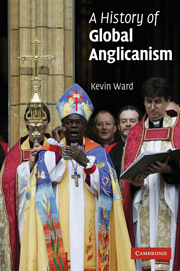Book contents
- Frontmatter
- Contents
- List of maps
- Preface
- List of abbreviations
- 1 Introduction: ‘not English, but Anglican’
- 2 The Atlantic isles and world Anglicanism
- 3 The United States
- 4 Canada
- 5 The Caribbean
- 6 Latin America
- 7 West Africa
- 8 Southern Africa
- 9 East Africa
- 10 The Middle East
- 11 South Asia
- 12 China
- 13 The Asian Pacific
- 14 Oceania
- 15 The Anglican communion: escaping the Anglo-Saxon captivity of the church?
- Maps
- Bibliography
- Index
- Frontmatter
- Contents
- List of maps
- Preface
- List of abbreviations
- 1 Introduction: ‘not English, but Anglican’
- 2 The Atlantic isles and world Anglicanism
- 3 The United States
- 4 Canada
- 5 The Caribbean
- 6 Latin America
- 7 West Africa
- 8 Southern Africa
- 9 East Africa
- 10 The Middle East
- 11 South Asia
- 12 China
- 13 The Asian Pacific
- 14 Oceania
- 15 The Anglican communion: escaping the Anglo-Saxon captivity of the church?
- Maps
- Bibliography
- Index
Summary
SOCIETY, RELIGION, CASTE
The India which became the focus of missionary interest from the early eighteenth century was a vast and diverse society, not least in its religious traditions. The core values of India were shaped by what became known as Hinduism. The Mogul conquest had introduced Islam to much of North India, and from there to the rest of the sub-continent. Other religious minorities were significant in specific areas, notably the Sikhs, the Jains, and the indigenous Christians of Kerala. Scattered throughout the sub-continent were ‘tribal’ people who were not integrated into the dominant culture of India. ‘Hinduism’ as a ‘religion’ was in many ways a construct of eighteenth-century European attempts to understand and make sense of the complex religious and social reality of India. Western intellectuals – Orientalists, as they came to be called – looked to the sacred Sanskrit texts as the norm by which to understand Hinduism, applying to India understandings of religion arising from the Christian tradition. A distinction was made between ‘the Great Tradition’ of the classical Hindu Scriptures and ‘the Little Tradition’, the multiplicity of traditions of popular, village Hinduism.
Early nineteenth-century Christian missionaries tended to begin with an aggressively negative attitude to Hinduism in the abstract, though this might become tempered by the actual experience of sustained encounter. The British presence in India was mediated through the East India Company, regulated by, and responsible to, the British Parliament, but an unofficial body itself.
- Type
- Chapter
- Information
- A History of Global Anglicanism , pp. 213 - 243Publisher: Cambridge University PressPrint publication year: 2006



